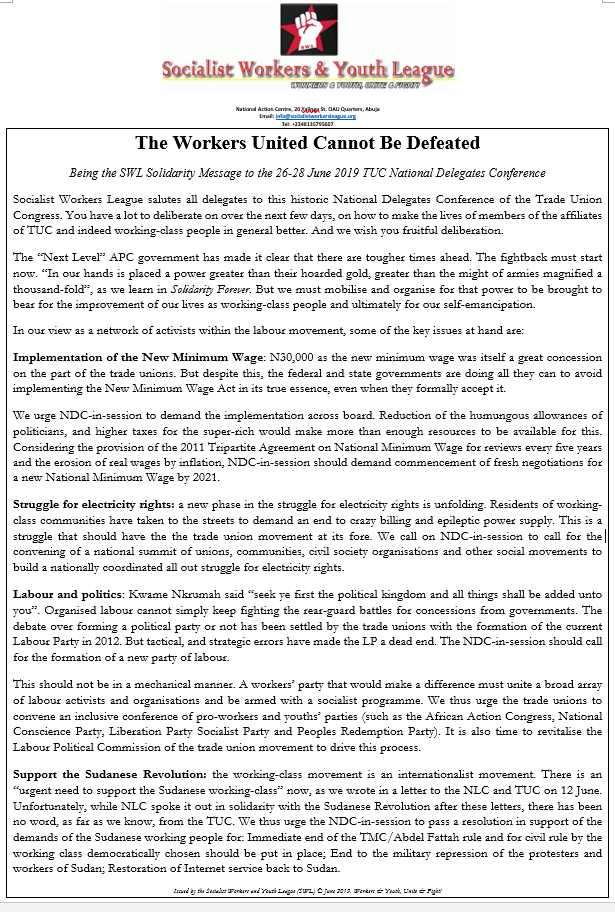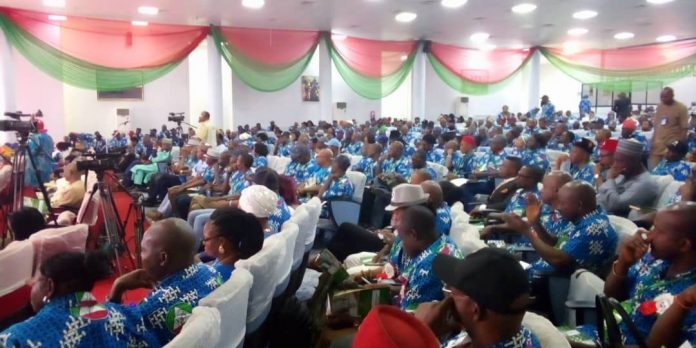Members of SWL from several unions joined over 700 unionists as delegates to the 11th National Delegates Conference of the Trade Union Congress (TUC), which commenced earlier today. These delegates, drawn from the 18 affiliates of the TUC will deliberate on the policy direction of the trade union federation for the next three years, and elect a new leadership.
In SWL’s message circulated as a leaflet to the delegates, we point out the need to build workers’ power through mobilisation and organising, and with this, struggle for the improvement of the lives of working-class people and revolutionary transformation of society.
An all-out fight for the full implementation of the pittance of a new national minimum wage is one of the main challenges that will face the new leadership of the TUC, in conjunction with the other trade union centres.
Speaking at the opening session of the Conference, the Secretary to the Government of the Federation, Mr Boss Mustapha who represented President Muhammadu Buhari promised workers that the implementation would start soon. In urging state governments and the private sector to do this, he expressed the view it would encourage workers’ contribution to national development.
First, this is an insult on us as workers. It is our wealth which creates the social wealth that Mr Boss and all the bosses together feed fat on. If there is any class that needs to contribute more to social development, it is the class of the rich people who milk our labour and natural resources dry and hardly pay commensurate taxes (when they pay at all) on their humungous ill-gotten wealth.
And more importantly, organised labour should not at all be deceived by the sweet talk of the federal government. We must not allow the issue of implementation of the new minimum wage to go like that of the 2011 national minimum wage.
Till date there are still a significant number of states that never paid up to N18,000 as minimum wage. Some, like Zamfara pay as little as just over N7,000. And to rub salt on open wound, non-payment of backlogs of the miserly salaries public sector workers are supposed to take home has been the norm across the states.
The situation in terms of the real wages of workers in the private sector is no better. And casualisation has become generalised with tens of thousands of workers thrown out of jobs in the manufacturing sector.
The new leadership that will emerge at the ongoing conference thus has its job cut out for it. It must be at the fore of struggle for; full implementation of the new minimum wage, zero tolerance for non-payment of salaries as and when due, and to stop the casualisation of labour.
It is also important for organised labour to play its role as the leading social force of working-class people by being at the fore of mass mobilisation to enthrone democracy from below, including the struggle of communities for electricity rights.
However, it is not enough for us to only continue fighting against the power of the bosses, this approach will keep getting us nowhere no matter how many episodic rallies are organised. We have to fight for power and form a workers’ government. To do this, as we noted in our solidarity message, the trade unions need to form a new party of the working people, which brings together all radical and revolutionary forces committed to system change.

To play their pivotal role in the struggle for working people’s democracy, the trade unions themselves must uphold internal democracy. Elections must not be a do or die affair. And it should be noted that the unions as affiliates and not individual persons are the membership of a trade union centre such as the TUC.
And the NDC should not be reduced to elections, with just passing interest accorded to issues of policy and principles. One of the most fundamental principles of the working-class movement is international solidarity.
Today, as the TUC’s Congress deliberates, workers in Sudan who have stood gloriously at the head of a democratic revolution which toppled the 30-year tyrannical rule of Omar al-Bashir are facing ruthless repression. At least 108 have been killed, and hundreds arrested.
The TUC NDC-in-session should call for an end to the repression in Sudan and declare support for the demands of the Sudanese working-class including; “Immediate end of the TMC/Abdel Fattah rule and for civil rule by the working class democratically chosen should be put in place; End to the military repression of the protesters and workers of Sudan; Restoration of Internet service back to Sudan.”
The repression of working-class people equally continues in Egypt. Just two days ago, journalist Hisham Fouad and at least seven other activists were arrested and detained for no just cause. The Congress should demand their immediate release.
An “injury to one is an injury to all”. We must remember how trade unions across the world stood by us during the dark days of military dictatorship. And even more recently, during the January 2012 general strike and mass protests which shook the Nigerian state to its bone marrow, several trade unions, and trade union federations in Africa and across the world stood in solidarity with the Nigerian working-class.
The origins and early history of the TUC itself speaks to the power of working-class independence in defiance of the bosses’ state’s dictates. When about a thousand trade unions, spread across four federations, decided to unite as one centre, based on the Apena Declaration of 21 September 1973, the federal military government immediately came up with a “new labour policy” of “limited intervention” and “guided democracy”.
This inglorious carrot and stick mechanism included the so-called re-organisation of the trade unions into “industrial unions” in 1976-78. Those “industrial unions” were constituted into a sole “central labour organisation” i.e. NLC. Meanwhile, “senior staff associations” were deemed not to be unions and thus denied bargaining rights.
But these “associations” came to constitute themselves into the Senior Staff Consultative Association of Nigeria (SESCAN). Its Lagos state chapter affiliated to the Campaign for Democracy in 1991, thus playing an important role in the struggle against military dictatorship in the early 1990s.
It was SESCAN that transformed into the Trade Union Congress (TUC) in 2000. And even at that, the civilian government refused to recognise it as a trade union centre, although its affiliates were by then accorded the rights of trade unions i.e. could negotiate collective agreements (this shows there is little essential difference between the military and civilian governments of the bosses’ state).
It took another five years before the TUC was accorded the status of a trade union federation. And this was simply because the Olusegun Obasanjo-led government wanted to break the back of the NLC for leading struggles against increments in fuel pump price between 2000 and 2004.
However, the collaboration between TUC and NLC since then, including joint organising of May Day activities goes to show, as well that, the bosses cannot manipulate us. Now is the time to take that spirit of working-class unity and independence a step further, with struggle until victory for the full implementation of the new national minimum wage, and with the formation of an all-inclusive fighting party of the working-people.
We wish delegates at the 11th TUC NDC fruitful deliberation. And we leave you with a simple message: DARE TO STRUGGLE! DARE TO WIN!!
by Baba AYE









